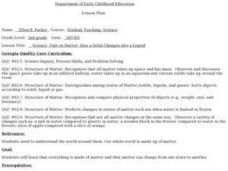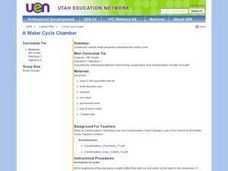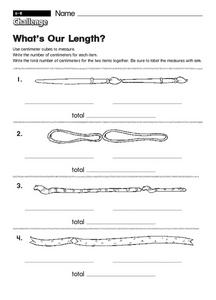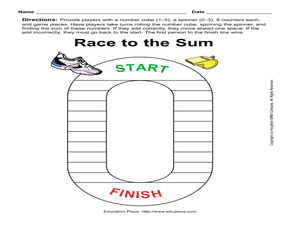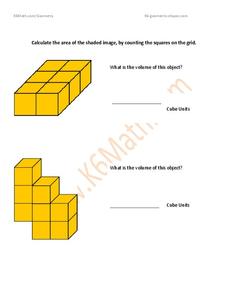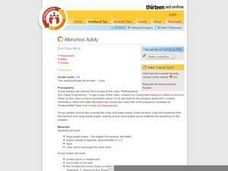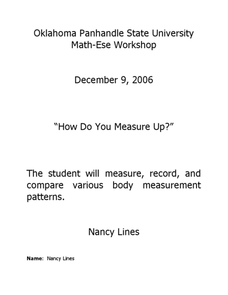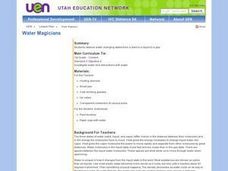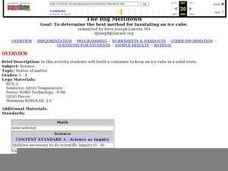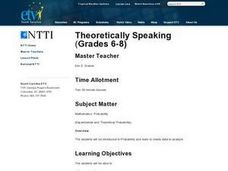Curated OER
Float My Boat
Fourth graders, in groups, experiment with density and the displacement of water by creating and designing their own boats and seeing which boat holds the most centimeter cubes without sinking..
Curated OER
New Boxes from Old
Ninth graders take a rectangular box (e.g., a cereal box) and cut it up to make a new, cubical box with the same volume as the original. In so doing, they will discover that because the cubical box has less surface area than the...
Curated OER
Help Save the Polar Bear
Students use ice cubes to demonstrate how the polar ice caps are melting and how it effects the polar bears. In this polar bear lesson plan, the teacher explains how polar bears live on the north pole and how they are having trouble due...
Curated OER
Freezing and Melting
In this freezing/melting learning exercise, learners observe ice cubes and answer a set of 8 related questions.
Curated OER
Precipitation
Students investigate the formation of rain. They experiment by boiling water in a tea kettle and placing ice cubes and water in a pan. They hold the pan of water over the steaming spout so that the steam strikes the bottom and sides of...
Curated OER
The Challenge of Ice and Water
High schoolers work in teams to solve a variety of challenges involving water. They move an ice cube from one glass to another without touching the ice or the glass. They move water from one glass to another and they estimate the number...
Curated OER
Science: How Solids Become Liquids
Second graders discover how matter changes from one state to another by observing melting ice cubes. They decide on means to warm the ice and predict what will happen. Students record how long it takes for the cubes to melt.
Curated OER
A Water Cycle Chamber
Fourth graders are shown the water cycle by watching a demonstration by their teacher. In groups, they are given one two-liter bottle with a starter hole and follow instructions to complete the set up. They place ice cubes into the...
Curated OER
Groups of Ten Tens
In this place value worksheet, students read about counting by tens using rows of cubes. They circle groups of 10 rows and write how many hundreds they make.
Curated OER
What's Our Length
For this measuring length worksheet, students use centimeter cubes to measure the length for each illustrated picture. Students write the number of centimeters for each picture and add the centimeters for both items. Students write the...
Curated OER
Race to the Sum: Addition Game
In this addition worksheet, students play an addition game using a number cube, spinner, 8 counters and game pieces. Students add the sum of a rolled number and spinner number to move forward.
Curated OER
Calculate Area Using Shaded Grids
In this area worksheet, students calculate area of shapes using shaded grids, writing answers in cube units. A reference web site is given for additional activities.
Curated OER
Funky Food Farm
Students research about ways to keep food from spoiling. In this health science lesson plan, students design an experiment to keep the ice cubes from melting. They present their designs and results in class.
Curated OER
3-D Figures Part 2
Students work with three dimensional objects. In this geometry lesson, students examine models of spheres, cones, cubes, prisms, and pyramids, and identify them by their edges, vertices, and faces.
Curated OER
I See a Rainbow
Students identify the different colors in a rainbow. They experiment with dropping food coloring into a water and then making ice cubes. They discuss what happens to the water in the freezer
Curated OER
Don't Box Me In
Students explore the relationship between flat and three-dimensional shapes. They identify the names of 3-D shapes and construct cubes from squares.
Curated OER
How Do You Measure Up?
Students explore the concept of measurement, modelling the increments on a standard ruler using cubes and grid paper. They identify the length of a line to a designated standard unit and measure specified body parts.
Curated OER
Water Magicians
First graders observe water changing states from a solid to a liquid to a gas. They predict what they think happen to ice cubes as they sit out. They paint water with paintbrushes outside the classroom in the sun and watch the water...
Curated OER
The Big Meltdown
Students work together to develop a container to keep an ice cube in a solid state. They identify the three stages of matter and test different materials for this experiment. They share their results with the class.
Curated OER
Construct Figures to Find Specific Volume
Sixth graders use number cubes to explore volume of two-dimensional shapes. They roll a die and construct a shape using the numbers rolled as measurements of the sides. They estimate the volume of a given object, and then use the...
Curated OER
Odd One Out
Ninth graders identify and describe in their own language, the following 2-dimensional shapes: square, circle, box, pentagon; classify objects by shape attributes. They then list a number of properties that distinguish squares from...
Curated OER
Fourths of Sets
Students create a set of cards that represent factors of four and use these cards to play a game in which they practice separating numbers into fourths. They first practice separating numbers into fourths with a projected computer...
Curated OER
Theoretically Speaking
Students define probability. They determine outcome from a given situation based on simple probability. Students create experimental data using a coin and a number cube. They write how theoretical and experimental probability are different.
Other popular searches
- Cubing Activities
- Cubing Strategy
- Cubing Reading
- Writing Cubing
- Cubing Writing
- Writing Cubing Activities
- Cubing Math
- Squaring and Cubing
- Cubing for Biology
- Cubing Activities English
- Cubing + Writing
- Cubing Strategy Math









